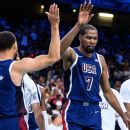How Premier League and NFL prove it's not megastars who make a league successful
You hear it again and again. Sports is entertainment, entertainment is driven by stars and therefore, for a sport to be successful, it needs stars. Whether it’s LIV Golf or Paris Saint-Germain with their (once great, now almost all gone) front trio of Neymar, Kylian Mbappé and Lionel Messi, or the endless gushing about the impact that Messi will have/is having on Major League Soccer, the future of the sport in the United States, Apple’s share price and even weather patterns in Miami-Dade County, conventional wisdom has it that star power brings eyeballs and commercial success.
Well, conventional wisdom is wrong. Stars and big followings matter, yes, but a compelling product on the field of play matters a whole heck of a lot more.
Consider the National Football League and the Premier League, probably the two most commercially successful professional leagues in the world.
The Super Bowl was played over two weeks ago. Hand on heart — and assuming you’re not a San Francisco 49ers or Kansas City Chiefs fan — how many of those players would you recognize out of uniform? Patrick Mahomes? Yup. Travis Kelce? Sure, though it helps that he co-hosts one of the most successful podcasts of our time with his equally famous brother and dates somebody named Taylor Swift.
Christian McCaffrey? Probably. Brock Purdy? Maybe, because you’ve watched moving features about going from Mr. Irrelevant — the last pick in the NFL draft — to starting in the Super Bowl.
From there? My guess is not many. Partly because they wear helmets at work, partly because star power — quarterbacks aside — isn’t as central to the NFL’s success as some would have us believe.
It’s a similar story in the Premier League. In terms of global viewers, media attention and commercial success, it has dwarfed every other domestic league for the past two decades. And yes, there are stars — plenty of them — but nowhere near enough to justify the notion that they’re an integral part of the league’s success.
– Stream on ESPN+: LaLiga, Bundesliga & more (U.S.)
Don’t believe me? Ask Richard Masters, the Premier League chief executive: he runs the whole shebang. And in August, at a media briefing, he said: “We’ve had a share, but by no means the lion’s share of what you’d call the most recognizable footballers in the world, many of which are in the French league and Spanish league at the moment.”
Still want to argue? OK, which metric shall we use? How about social media following?
According to Football Benchmark, of the 10 most-followed players across all social media, just one, Mohamed Salah, who is seventh, is playing in the Premier League right now. Only three others have ever even played in the league: Harry Kane (10th, now at Bayern Munich), Paul Pogba (fifth, and without much success) and Cristiano Ronaldo (first, though he was there at the very beginning and very end of his career).
Not satisfied? OK, how about the Ballon d’Or? Regular readers will know that I find it pretty darn meaningless as an award, but as a measure of star power and popularity, it’s second to none. Over the past 20 editions of the award, there have been 60 spots on the podium; just 12 have gone to Premier League players.
What’s that you say? The numbers for the past 20 Ballons d’Or are distorted because of the presence of two GOAT outliers such as Lionel Messi (who never played in England) and Ronaldo (who spent 12 years in his prime in Spain and Italy)? OK, fine, pretend they don’t exist and take them out of the mix. Of the 60 places on the podium in a non-Messi/Ronaldo world — not a world I’d like to live in — just 15 went to Premier League players.
Those are just numbers, of course, and we can debate what “global megastar” means until the cows come home. (For my money, Salah unquestionably fits the bill, as does Erling Haaland. Beyond that, it’s a matter of where you draw the line.) And, obviously, some players are among the very best in the world at what they do without that “box office megastar” vibe — Rodri, Bruno Fernandes and Kevin De Bruyne spring to mind, though they are far from the only ones — but to Masters, it’s pretty simple. The Premier League, he says, is a “brilliant football competition” with “genuine jeopardy” on the pitch.
“That’s the most important thing. … It doesn’t need to have every single one of the best players in the world to make it work,” he adds.
Throw in a 100-year-plus history, teams that are globally recognised brands, a well-packaged TV product and clever marketing folks, and that’s pretty much your formula. You don’t need Mbappe or Neymar, let alone Messi or Ronaldo.
(The NFL, of course, doesn’t have the jeopardy factor — the Carolina Panthers won’t be relegated despite going 2-15 — but what it does have are mechanisms like the draft, the salary cap and free agency to ensure that every few years, almost any team can be competitive.)
Superstars can provide a boost, of course, but maybe their impact is somewhat overstated. Take the Saudi Pro League. Karim Benzema, Neymar, Sadio Mané and Ronaldo himself all joined, along with a host of other big names, over the past 14 months. They even got the Undertaker, for chrissakes! And what happened? Average attendance is actually lower this year than last season (fewer than 8,500 fans per game), and the few times the world has paid attention it has generally had to do with off-the-pitch issues, like Benzema being stranded in Mauritius by a tropical storm, Jordan Henderson successfully engineering his return to Europe or Mane getting married.
The lesson from the NFL and the Premier League is pretty clear, and somewhat counterintuitive. Star power is great, but it’s incidental to getting the basics right. It can’t be the driver of a league’s medium- and long-term success for the simple reason that celebrity is ephemeral (and often overvalued). The sort of fans who stick around — and pay for the privilege of doing so — look beyond the bling.




